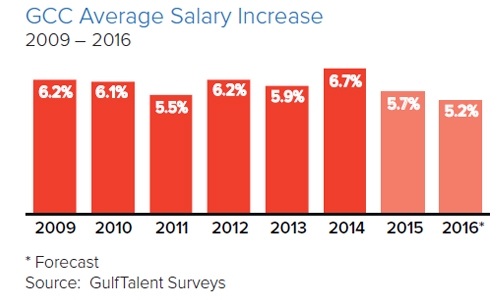Bahrain to face lowest salary hike in GCC
Manama : This year, GCC workers will see the lowest salary rise of the decade, according to a recent report by recruitment firm GulfTalent.
Bahrain employees might be severely affected with average-wages rising only at the rate of inflation, with no increase in their disposable incomes.
“Many professionals in 2016 are likely to face a double-whammy of rising living costs as a result of cuts in government subsidies, coupled with stagnant wage growth due to the depressed hiring market. As a result, real salary increases net of inflation are expected to be significantly lower than in previous years. Bahrain is expected to fare the worst, with average wages rising only at the rate of inflation, leaving many professionals with no increase in their disposable incomes.”
One source of comfort for residents is falling rents in parts of the region, in an otherwise inflationary market, the report found.
The research report was based on GulfTalent’s survey of 700 employers and 25,000 professionals across the six GCC states. Drawing on its survey results, the study found that salaries across the GCC are forecast to increase at an average of just 5.2 per cent in 2016, down from 5.7pc in the previous year.
In Bahrain, Government’s amnesty on illegal expatriates has provided employers with a fresh pool of locally experienced workers but dearth of new development projects due to reduced government spending has dampened hiring activity, says report.
GulfTalent’s study also noted that, despite a marked slowdown, the situation in Gulf countries remains far more stable than in most other oil-dependent economies.
According to the Economist Intelligence Unit, all GCC countries are expected to have stable currencies and register a positive economic growth in 2016, with governments using their reserves to maintain critical investments. This is in sharp contrast to Russia where the oil price collapse has already led to severe recession and a 50pc plunge in the value of the currency since 2014.
In addition to lower pay rises, the study reported a marked slowdown in recruitment activity, with employers much more cautious in adding to their payroll. Much of the recruitment activity is now focused on replacement hiring only.
Sectors that are particularly hit include oil & gas and construction, which depend heavily on government investment. On the other hand, retail has seen limited impact and healthcare is booming, driven by a combination of population growth and regulatory changes making healthcare provision mandatory for employers. Sixty-eight pc of healthcare companies surveyed reported an increase in their headcount during 2015.
Related Posts

